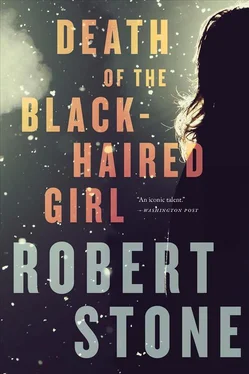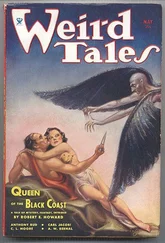There were a few men among the marchers, mainly older, wearing imperfects discounted at the mall, looking as though they had just come from the slot machines at the nearest low-rent casino. People smoked.
Some of the women protesters had a few pale hardscrabble children with them and carried signs that read STOP THE MURDERS, GOD IS LOVE and SAVE GOD’S ANGELS. Others carried more aggressive placards: DEATH TO THE HATERS OF LIFE; ROME FELL THROUGH FOUL ABORTION, OUR COUNTRY WILL TOO; WHORES WILL DIE OF THEIR SIN. They somehow drew onlookers’ attention to the crazies in the crowd, who seemed as if they’d grown close to Jesus the hard way.
Maud, newly an editor of the college’s Gazette, wanted to strike against the harassment at Whelan. What infuriated her most were the pictures of terminated fetuses a few of the demonstrators carried. Maud had a plan to deal with their piety, make them eat their miraculous chain letters to Saint Jude and the pictures their potbellied epicene prelates and blow-dried chiseling preachers had assembled. She would write an article for the Gazette, and she too would collect pictures to include with it. These pictures were as genuinely moving and heartbreaking as the others, though they bespoke a different point of view. Maud thought them an answer to the murdered cute kids’ photos.
Maud was still outside the hospital entrance when she ran into Jo Carr, an ex-nun who worked in the college counseling office. They had been friendly two years before but rarely saw each other now.
“Hey, Maud,” Jo called to her. “Come help us out! We can use some candy stripers on the wards.”
“If I ever have time, Jo. Maybe.”
“Time,” Jo said. “They don’t give you much, I know.” She looked at the grim procession of pro-lifers. She would not have included life on their list of things to cheer for. “Gonna write about these demonstrators?”
“Wait and see,” Maud told her.
Jo shook her head. “Don’t be cruel!”
“Cruel!” Maud half shouted. Jo hurried to disengage as she walked down the hill.
“The wrong side has feelings too, kid.”
What Maud really wanted to do was see Brookman, but she elected to go swimming instead. When she got back to Cross to get her pool gear, the place was empty. Shell had gone out for fencing practice, which, along with the gymnastics and the enunciation lessons, was part of the highly regarded theater course at the college. Maud grabbed a change of lingerie and a clean denim shirt for after-swim, her own clothes this time.
It had started to snow lightly again by the time she got to the gym. It was called the Biedler Athletic Center, after the grain millionaire who paid for it, a brick modernist building showing lots of glass and built into a low hillside. Through the dark winter evening, in the exciting whirl of snowflakes, its lighted windows were welcoming, promising warmth and invigoration beyond them. The gym had a huge lobby with overhead and floor lights. At the entrance, a blond basketball giant with a bony Slavic face checked her college ID.
She could hear shouts, grunts, stomps, the smash of rubber balls against hardwood floors, the sounds echoing down tiled hallways but muted by the resilient walls. Somewhere in this building Shell was practicing her swordswomanship, and Maud, who had never seen her at it, wanted a look. She went down corridors peering through the small windows in the doors until, on the second floor, she found Shell in her mask and whites, engaging a shorter, chunky girl with close-cropped hair. Maud watched through the rectangular window. Shell’s opponent was standing her ground in what apparently was the classic position, parrying Shell’s thrusts. Shell looked skittery and a lot less expert but Maud could hear her little yelps when she leaned into an attack. It was fun to watch but embarrassing to see her roommate being defeated.
The water in the pool downstairs was cold. A few lanes were free because of the weather outside; only the dedicated swimmers were there. The funny thing about swimming, Maud reflected, was that counting laps to make the mile distance absorbed your consciousness so that you thought about the count even when the crawl stroke was the farthest thing from your mind. This, she knew, was an upside; it was boring but peaceful, and it strengthened her resolve in what she was about to do. After the laps she took a hot shower, toweled off and dried her hair. The few other girls in the locker room were aware of her.
Walking across downtown from the Common, Maud had the sleety snow at her back. From the practice fields half a mile away she could make out the players’ voices. One of the sports teams, weather or not. The old seminary buildings were past what was once the thriving factory district of Amesbury. The area was more prosperous than in years before, but it was still shabby. Along the curbs of Camp Street stood ridges of soiled snow refrozen after a thaw, being layered over once again by the falling flakes. There was black ice scarred with skid marks near the curb and frozen dead leaves that clogged the street’s drains, peeled rubber in the gutter, blackened chunks of tailpipe, wands of aluminum siding. The last block was across an overpass spanning the railroad tracks. An art gallery and an Ethiopian restaurant occupied the street level of a two-story building that leaned against the seminary.
Maud cut across the small quad where the Gazette lived and saw lights on. People stood just inside the door, out of the cold. She wanted the office to herself to get the job done. She walked out to the main street of town and went into Downey’s to nurse a beer at a table. It was a bar where most students didn’t go, a sort of townie bar. She was perfectly at home there unless some drunk hit on her. She was resolved not to let herself be swept into some scene or other. It was a night for serious business.
The tired waitress knew her.
“Hi, sweetie.” The woman lowered her voice. “No date tonight?”
Maud smiled. “Late date.”
From Downey’s, March Street took her to the falls, where the river that meandered deliberately along the edge of the Common coiled itself into the force that had long before spun a hundred wheels to make sailcloth for long-gone coasters. This was the far end of the old waterfront, the ungentrified part that never lent itself to any more development than a few microbreweries and loft sweatshops. Wheels here didn’t grind out anything but hard time for the poorest illegals in peonage, or the afternoons of young weight-watcher moms pedaling to music videos.
At the far side of the bridge, the corners were ruled by gangbangers preparing for their prison time, in hoodies, pants low. The street talk was lame now, left to professional rappers; the Spanish was without color; the English was groping. What they knew the ghetto kids couldn’t say. What they said came out of streaming media and not from the dead streets. People who followed such things — among them grad students in sociology — said the small children in the old wooden tenements that Norman Rockwell liked to people with his folk didn’t know jump-rope rhymes anymore, couldn’t play stickball or hopscotch or choose up sides going one potato two potato. In summer the basketball courts were empty. Grandma weighs ninety pounds, she’s on crack, mom’s a slave or turning tricks at interstate rest areas, adolescent dad’s working on his prison tats or wearing curlers for his roomie. All the graffiti is black.
Some might have thought that the two parts of the city — Maple Park the poor townie side and the college-Common area — didn’t intersect, but they did. Heroin had found a niche on both banks of the Mill River, its glint detectable to the aware in such unlikely realms as fashion photography. Models were as lean as ever and also conveyed a quality of anxious personal drama. Junkie chic had not disappeared and heroin still outsold cocaine.
Читать дальше












